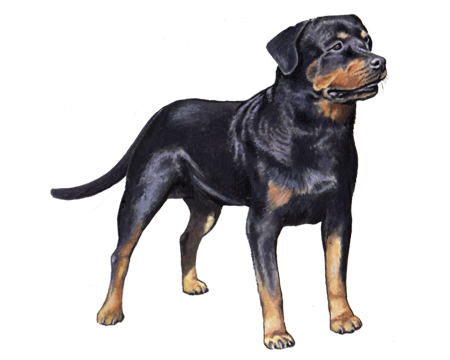
Boerboel
The Boerboel is a self-assured, smart, and calm dog. Boerboels might look a little intimidating at first, but they tend to be affectionate and devoted to family. They also serve as reliable and obedient watchdogs.
Interested in discovering if your dog is a Boerboel?
Check out Wisdom Panel's DNA tests.

Boerboel Traits
General Appearance
Big, but well-balanced, with substantial muscles from their necks to rumps, Boerboels have thick, arched necks and sloping shoulders.
Coat and Colouring
The Boerboel's skin is dark-colored (as is the roof of the dog's mouth). This protects against the heat of the sun. The breed's coat is short and dense, and it can be brindle, brown, cream, reddish-brown, or tawny.
Distinctive Physical Traits
Signature features of the Boerboel include a wide, block-like head, strong jaws, and broad chest.
Boerboel Temperament
Boerboels aren't for the faint-hearted. Because of their protective tendencies, strength, and size, they need to be properly socialized around other pets and people. Left to their own devices, Boerboels can become bored. They may occupy themselves by indulging in undesirable or destructive behaviors.


Boerboel History
The Boerboel is the only dog from South Africa that was developed to defend the home or farm. The word "Boerboel" derives from "boer," the Afrikaans/Dutch word for "farmer." The English word "bull" sounds to Dutch ears like "boel," hence, the name Boerboel. The name generally translates into "farmer's dog."
The Boerboel's exact ancestors aren't known. But experts believe the breed comes from native African canine species, as well as breeds brought into South Africa by Dutch, French, and English settlers. These include the Bullenbijter, a large, heavy Mastiff-type dog brought to the Cape of South Africa in 1652 by Jan van Reibeek. Bullmastiffs brought to guard the diamond mines in the early 1900s may also be in the bloodline.
Boerboel Care
Nutrition
The Boerboel should be fed a high-quality diet that is age-appropriate—whether it's commercially manufactured or homemade with a veterinarian's supervision and approval.
Be sure to monitor the amount of food you feed your Boerboel and reduce portions if your pup gains weight. Also, remember that giving too many treats can contribute to obesity.
Grooming
Due to their short, dense coat, Boerboels shed moderately. They look their finest when brushed weekly with a soft-bristle brush, rubber grooming mitt, or hound glove to remove any loose hair. This also promotes hair growth and distributes skin oils throughout the coat, keeping it healthy.
Boerboels require only occasional baths, but their nails should be trimmed regularly.
Exercise
Strong and athletic, Boerboels need a fair amount of daily exercise—either on a leash or in a securely fenced area. Trips to the dog park are generally not a good idea, as Boerboels do not like to be challenged by other dogs and have a protective nature.
To provide both physical and mental stimulation, engage your Boerboel in obedience training, agility competitions, protection sports, or stock work.
Training
The Boerboel was originally bred to guard people and property. Firm and dedicated training can help temper your dog's protective tendency and ensure they behave safely around other animals and people.
Training your Boerboel will take lots of time and energy, but it's essential to make your pup happy and well-adjusted. Be sure to also introduce your Boerboel breed to a variety of sights, sounds, species, and experiences (known as "socialization") while young to improve their social skills.

Boerboel Genetic Health Conditions
-
Canine Multifocal Retinopathy 1
Canine Multifocal Retinopathy 1 (CMR1) is an eye disorder that can cause retinal decay which may impact vision, but very rarely results in blindness.
-
Hyperuricosuria
Hyperuricosuria (HUU) is a condition that predisposes affected dogs to the formation of urinary stones, such as kidney or bladder stones.
Knowing if your Boerboel is a carrier or at-risk for these conditions can help you and your veterinarian plan for your pup's lifelong care. With Wisdom Panel™ Premium, you can get results for over 200 genetic health tests.
Breed Group
Guard
Dogs of the Guard Group were bred to guard people and property. They are often quick to learn and these intelligent, capable animals make solid companions.























